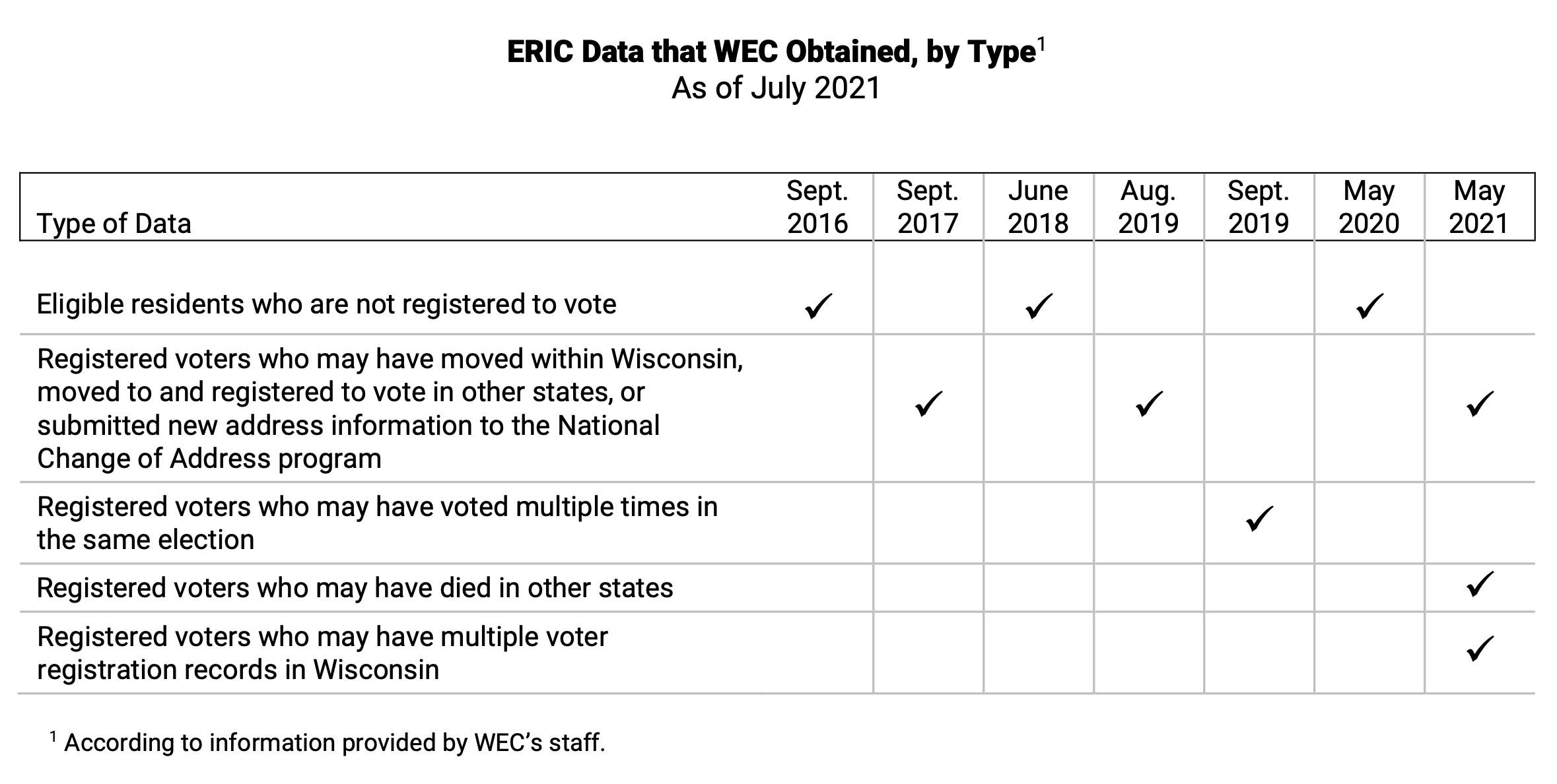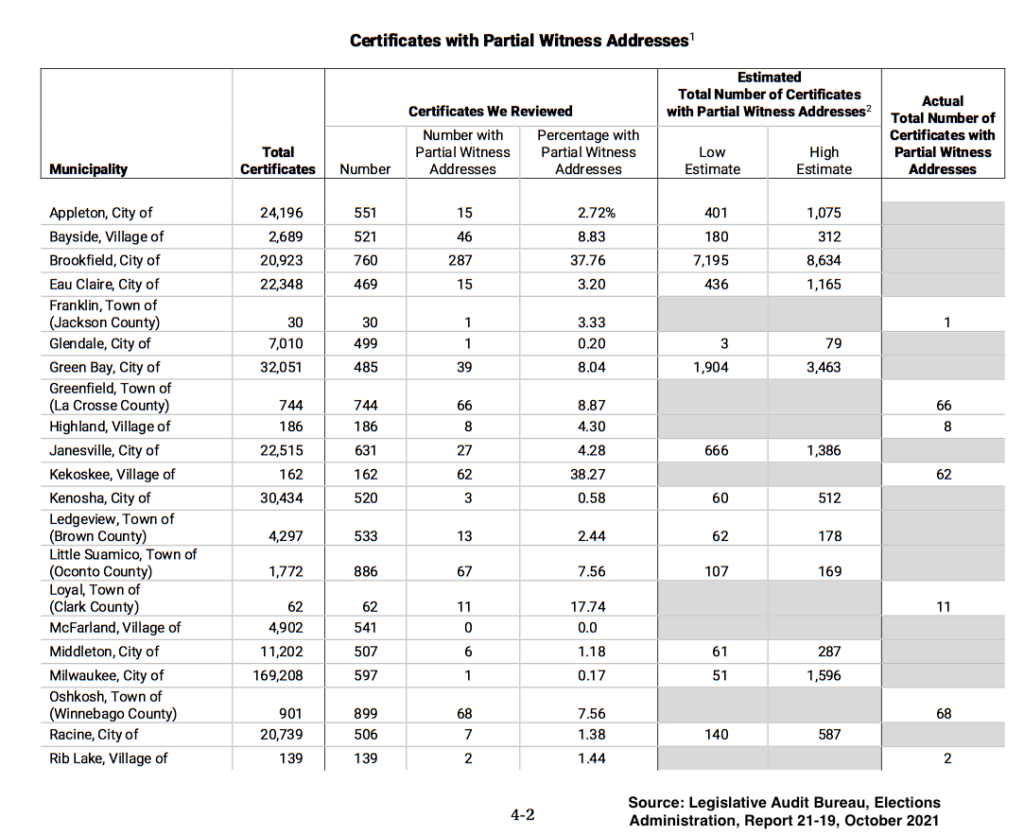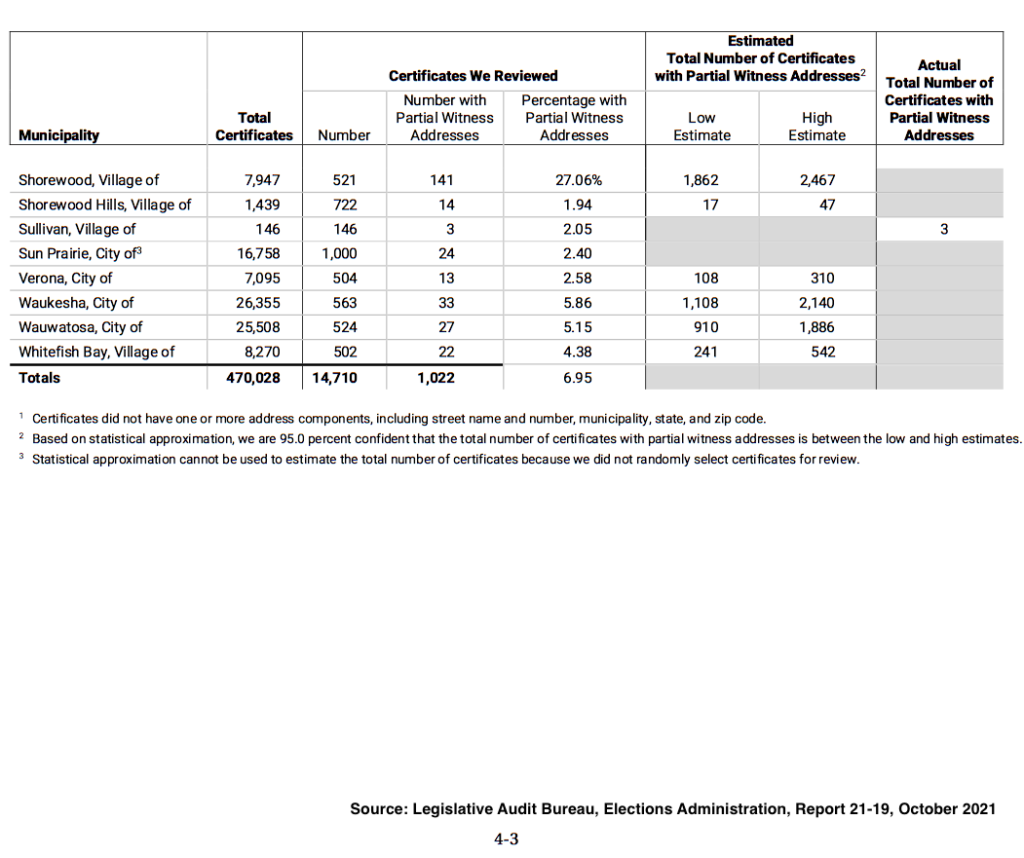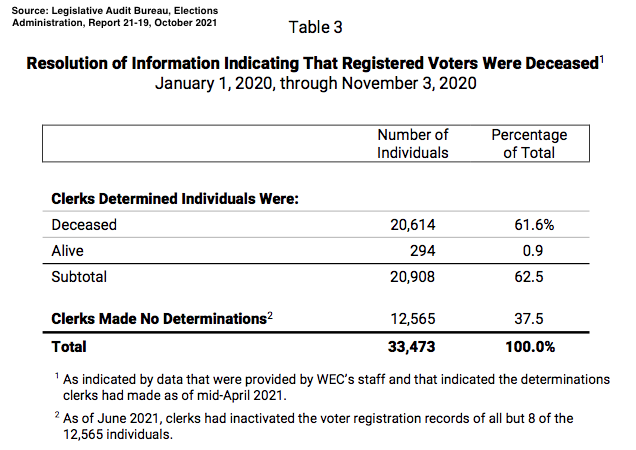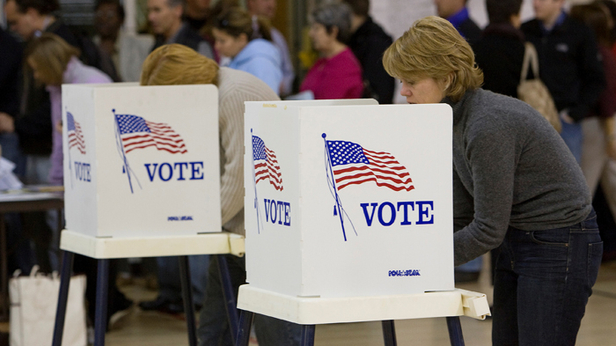
October 22, 2021 | MacIver News Service
By: Bill Osmulski
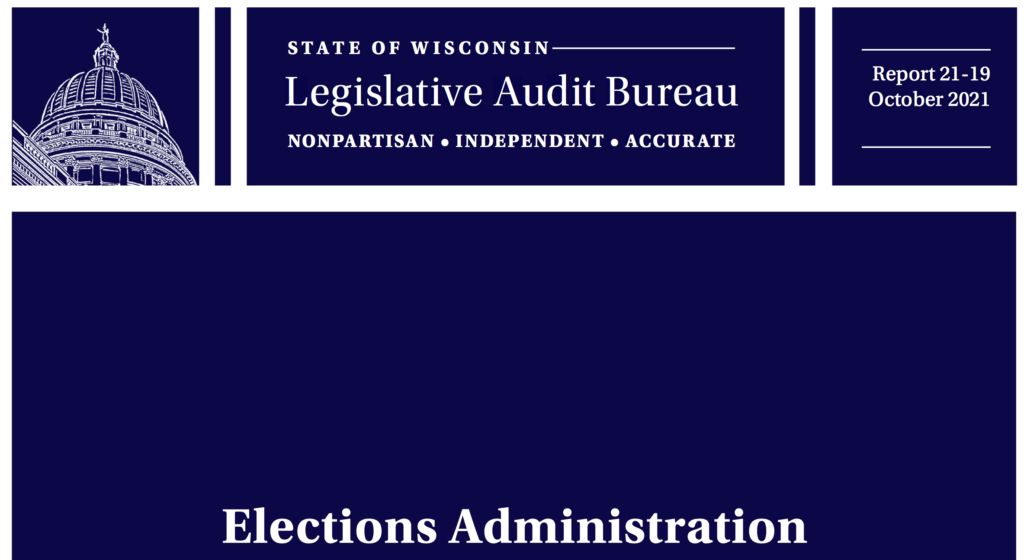
The Wisconsin Legislative Audit Bureau released its report on the 2020 election Friday, after receiving limited cooperation from officials.
- Auditors were able to interview 2 of 6 Wisconsin Election Commissioners. An additional commissioner provided written testimony, but the other three declined.
- Also, Auditors were not allowed to physically handle election-related materials from the City of Madison.
- Auditors tried to survey every municipal clerk in the state, but only 48% responded. Out of the 72 County clerks, 82% responded.
Despite these barriers, the Auditors made several explosive discoveries.
WEC Ignores National Database That Identifies Potential Problems?
Among the most alarming problems identified in this audit is how WEC uses the ERIC (Electronic Registration Information Center) database. ERIC allows states to determine if residents are voting in multiple states, have died in other states, moved within the state, voted multiple times in the same election, or are eligible to vote but not registered.
It turns out WEC had never run a report on whether people had multiple registrations in Wisconsin or died in other states going back to 2016. The first time it ran the report was in May, after the auditors started poking around. The only ERIC report it ran in 2020 was for eligible voters who weren’t registered.
New Voter Registration Non-matches
There were also problems with how WEC administered the Help America Vote Act (HAVA), which requires voters to provide a driver’s license (or social security information) when they register. In 2020, 957,977 Wisconsinites registered to be a new voter. Of the 957,977, 898,421 of the new registrations matched corresponding records used as an integrity check at the Department of Transportation or 93.8%. Which means that 45,665 new voters registered with driver’s license information that did not match DMV records or 4.8%. Each of those mismatches is a potential indication of voter fraud, but WEC was unconcerned.
“WEC’s staff instruct clerks to correct the voter registration if they can determine that the non-match was the result of a data entry error. Otherwise, clerks are instructed to inform the individuals that they should resolve the mismatched information,” the audit explains.
According to the Audit, of the 45,665 total non-matches, 63.1 percent were from a name non-match, meaning the name submitted by the new voter on the ballot application did not match the name on file at the DOT. Shockingly, the DOT does not provide WEC with the reason of the non-match, so “clerks are uncertain whether a non-match occurred because of only a slight difference in a given individual’s name, which may indicate little cause for concern, or a significant difference, which may indicate that an individual is attempting to register to vote by using another individual’s information.”
According to the Audit, WEC staff did not attempt to match 13,800 new voter records for a variety of reasons.
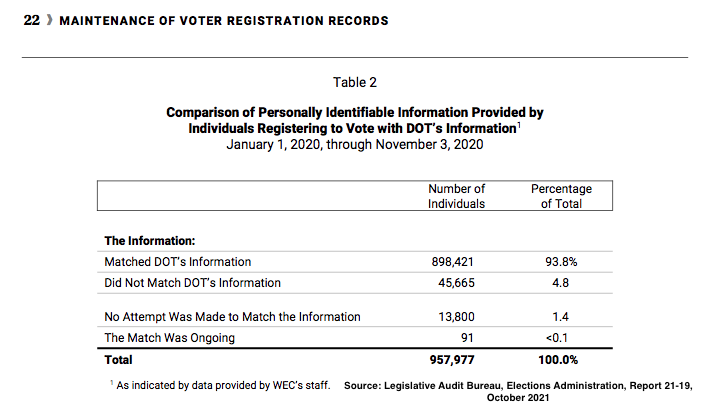
New Voter Registration Signatures
WEC failed to follow state law which requires them to obtain electronic signatures of new online registrants. According to the Audit, WEC staff apparently decided on their own to ignore state law which requires them to check the signatures of the new voters with the signatures on file at the DOT. The bureaucrats at both agencies attempted to make excuses as to why it could not or it might be difficult to follow state law.
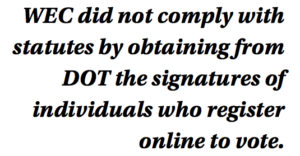 Early Absentee Voting
Early Absentee Voting
In the November 2020 election, 1,963,954 absentee ballots were cast, or 59.6 percent of all ballots cast. In this analysis, the LAB selected 30 municipalities to do a random review of some of the absentee ballot applications, which is typically the envelope that the potential voter returns his/her absentee ballot in.
Of the 1.96 million absentee ballots cast in the November 2020, the 30 municipalities selected for review had 470,028 votes cast by absentee ballot.
Only 1 municipality, the City of Madison, refused to cooperate and allow the Audit Bureau to physically review the absentee applications.
So these 29 municipalities had 23.93% of all the 1.96 million absentee ballots cast in the November 2020 election.
The Audit Bureau physically reviewed 14,710 absentee ballot applications or 3.13% of absentee ballots in the 29 municipalities.
Problems discovered by the Audit Bureau with the 14,710 absentee ballots included: only a partial witness address, no witness address, no witness signature, or no voter signature.
Of the 14,710 absentee applications the LAB physically reviewed, 1,022 had only a partial witness address or 6.95% and not the full witness address which is clearly required by law.
Section 6.84 (2), Wis. Stats., indicates that notwithstanding s. 5.01 (1), Wis. Stats., the statutory provisions that require certificates to have witness addresses are mandatory, and the ballots accompanying certificates that are missing this information shall not be counted. Section 6.84 (2), Wis. Stats., similarly indicates that ballots accompanying certificates without voter or witness signatures shall not be counted during a recount.
Voting Fraud Evidence
Auditors did not set out to root out voting fraud, but several incidents seemingly fell in their lap.
They discovered 24 individuals with two active voter accounts just by checking the system for duplicate driver’s license numbers. Additionally, 8 felons voted in the election. Also, they found 11 people’s absentee votes were counted who died before election day.
Between January 1, 2020, and November 3, 2020, 33,473 deceased individuals matched records in the state voter system and were identified. Of the 33,473 dead individuals, local clerks acted on 20,908 of these individuals or 62.5% to clean up the voter roll. Surprisingly, according to the audit, clerks did not act on 12,565 dead individuals, or 37.5% of the 33,473 identified. However, the audit then states that “other data provided by WEC’s staff indicated that, in fact, clerks HAD inactivated” 12,406 of the 12,565 dead individuals that the local clerks had not acted on.
What? Very confusing and seems to suggest again that state law is being ignored. It also raises all sorts of questions about the competency of the WEC staff and the local clerks.
Interesting that the Audit Bureau found these potential double-voters and other problems, not the WEC staff or the local clerks. Even more troubling, according to the audit, is that the criteria used by WEC to “identify potentially duplicate records would not have discovered these records.” Audit Bureau also provided to the WEC the four individuals that the Audit Bureau believes may have voted twice.
The fact that WEC, whose job it is to make sure our elections are run in a fair, efficient, and transparent manner, did not do this review is troubling. This is literally part of their job description. Hard to know if we as a state have a problem with double voting if the agency in charge of keeping an eye on double voting does not check to see if there is double voting going on.
New Indefinitely Confined Voters With No Photo ID
The use of indefinitely confined status to vote exploded in 2020. According to the audit, there were 169,901 individuals who first declared themselves to be indefinitely confined in 2020. For context, prior to 2020, approximately 50,000 Wisconsinites declared themselves to be indefinitely confined. According to WEC data, 78% of indefinitely confined voters have submitted a photo id previously when he/she registered to vote. There are 48,554 indefinitely confined voters who do NOT have photo id on file with their local clerk. The LAB did not investigate if there were any problems with these 48,554 voters with no photo id.
The LAB found 1,001 individuals who declared themselves to be indefinitely confined but voted in-person at the polls on November 3rd.
Citizen Complaints and Concerns
When the legislature began asking questions after the 2020 election, WEC insisted no one had filed any official complaints with them about how the election was handled.
It turns out there were 34 official complaints, plus another 1,521 “concerns” that were submitted through a form on WEC’s website. (Someone submitting a “concern” might very well have thought they were submitting a complaint.)
WEC dismissed 25 or 34 complaints about the conduct of election officials and alleged violations of election law; 6 are still pending; 2 were withdrawn; and 1 was resolved by WEC simply telling an election official to follow the law.
Other Big Problems
The final report found WEC violated state law or advised others to violate state law in various ways.
- WEC violated state law by not issuing rules on how to train special voting deputies or election inspections.
- WEC told clerks they could go home on Election night and return the next day to finish counting, even though that is illegal.
- WEC told clerks they could relocate polling places within 30 days of the election, even though that is illegal.
- WEC failed to include current state law in its administrative rules on how to train municipal election workers. The rules have not been updated since 2016.
- WEC violated state law by not reporting the error rates for electronic voting equipment used in the Nov. 2020 election.
WEC fell short many ways, including:
- WEC’s last data-sharing agreement with DHS to identify dead voters expired in 2016.
- WEC’s last data-sharing agreement with DOC to identify felons was written before the WisVote system was created.
Local clerks had their share of missteps too:
- Local clerks failed to remove over 12,500 dead voters from the rolls before election day.
- Local clerks failed to remove 820 felons from the voter rolls before election day.
- Local clerks appear to have violated state law requiring them to initial absentee ballot certificates.
- At least 17.5% of municipal clerks did not complete their required training by election day. (WEC failed to notify the local governments when their clerks did not complete training.)
- 8.9% of municipalities still have not reconciled inconsistent data from the 2020 election in WisVote. Combined, those municipalities reported 2,840 more people voting than there were ballots cast.
Also concerning:
- 12,237 ballots were “remade” at central count facilities for a variety of reasons. (Remember the former Brown County Clerk observed workers using black pens for this task, which made the changes untraceable.)
- 12.9% of tamper-evident seals on ballot bags were unsigned by poll workers. The auditors wrote, “The forms without initials may indicate poll workers found problems with the seals or forgot to initial the forms.”
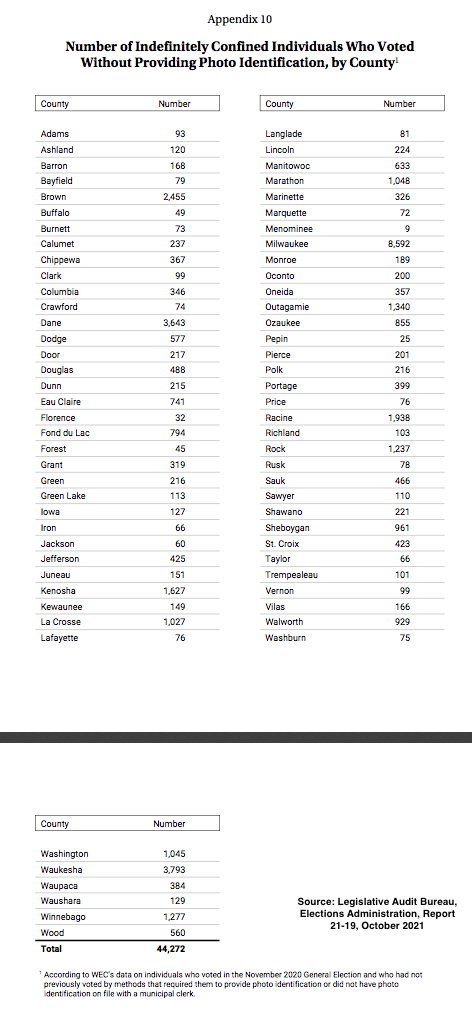
Audit Bureau: We are not touching that
Although they pointed out various state laws that were broken by WEC or other officials, there were certain high-profile incidents they chose to ignore.
Auditors did not determine if “Democracy in the Park” was an illegal ballot harvesting operation. Instead, the LAB pointed to small-town clerks, whose official office is their home, and collected ballots at alternate locations, as justification for Democracy in the Park.
Green Bay invited a Facebook-funded political operative to help run its election. The Audit Bureau did not determine if this was illegal or not. (It’s clear from Assembly Hearings on that matter, that the Green Bay consultant’s involvement violated state election laws.)
(Green Bay was not the only municipality to have a “consultant” working at central count. The report did not name the other one.)

Other Audits
The Legislative Audit Bureau is not the only entity looking into the 2020 election. Rep. Janel Brandtjen has been conducting hearings all year, and former State Supreme Court Justice Michael Gableman is conducting an independent audit on behalf of the Assembly Speaker’s office.
